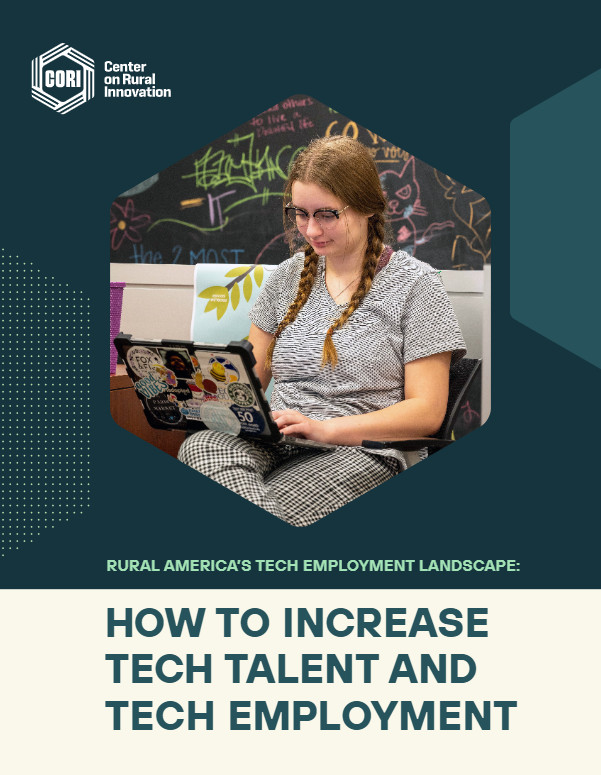20Fathoms was selected by Michigan’s Department of Labor and Economic Opportunity and endorsed by an array of community partners to convene an employer-led collaborative (ELC) focused on bridging the gap in our regional tech talent. The initiative is funded by the Michigan Industry Cluster Approach 3.0 grant and allows us to continue to build a regional hub for tech talent training. As our community seeks to support and attract growing businesses, the gap for tech talent will only grow without a robust response.
National Best Practices

Though the tech talent gap is a national issue, there are specific challenges in rural areas like Northern Michigan. As an incubator and member of the Center on Rural Innovation (CORI), 20Fathoms is in a unique position to leverage national data in the implementation of a successful local ELC strategy.
For example, the report CORI published in May 2022, “Rural America’s Tech Employment Landscape: How to Increase Tech Talent and Tech Employment,” provides a deep data dive into rural tech employment. Four central themes emerged in this latest report:
- The role of employers is critical – they must be involved at every level of talent development for visibility of tech opportunities and to ensure the training is aligned and relevant
- Rural Americans are interested in tech – across genders the interest in tech careers is equal at nearly 60%, yet those actually working in rural tech are overwhelming held by men
- Rural tech workers take a variety of paths into the field – there isn’t just one way to train for a successful tech career
- Lowering barriers for rural learners is essential – real and perceived financial and time commitments have held back those who were otherwise interested in tech training
“The research from CORI provides a roadmap for the ELC citing proven strategies that attract rural workforce to tech careers and successful employers who have built the internal structures to expand tech talent throughout the country,” said Gretchen Swanson, Director of Workforce Development at 20Fathoms.
She continued, “For instance, a logistics tech company in rural Georgia coordinated with their regional higher-ed partner to establish clear career pathways to paid internships. That company’s employees also received paid time to focus on mentoring and training in their field. Creating real life and real time opportunities for hands-on tech career experience has had the added benefit of increased talent retention by employees seeing the impact of expanding higher paying tech careers in their own community.”
Applied Locally
The US Chamber of Commerce Foundation’s Talent Pipeline Management (TPM)™ strategies have been adopted by Michigan’s Department of Labor & Economic Opportunity based upon national success and pilot programs here in the state. TPM strategies are employer-led, but not for employers alone. The partnership and coordination with all stakeholders are essential for a regional industry cluster’s success.
Collaboratives increase the pool of qualified talent by applying supply chain management principles. Of course, people aren’t to be equated to widgets, but through short- and long-term demand planning, a clear framework can be built. Employers recognize the days of hanging up the “help wanted” sign or posting a job online waiting for applicants are long gone. Talent, like any supply chain, must have resiliency and nimbleness built in, and relationships aren’t built overnight.

Both the TPM and the CORI research highlight the critical role employers play through the entire talent stream. Increased visibility of quality tech careers in the region give youth the signal that there is a reason to stay in their community, as well as to attract working-age professionals. Employers also need to be aware of existing K-12 STEM education and the partners offering credit and non-credit training. The ELC will provide that coordinated communication channel to training and education partners with aggregated regional data on the specific skills required so training can be developed and adapted as industry pivots with emerging technology.
“We have been excited by the early and enthusiastic support for the TPM approach as we prepare to convene the ELC,” said Gretchen. “There are some initiatives and programs around our community that the ELC will be able to better promote to new startups and legacy companies alike who are unfamiliar with them. Yet we all recognize the tech talent gap remain large. The TPM model will be able to clearly identify those mutual employer pain points from the data derived from the ELC. Again, this is employer driven, but not employers alone, so in coordination with partners, the ELC will leverage that data to map out the strategy to fill the identified gaps. Implementing a targeted action plan will take community collaboration to deliver the talent our region needs while offering clear pathways to family-sustaining careers,” said Gretchen.
How to Get Involved
20Fathoms has begun building the ELC in in recent months with early commitments from several employers and supporting regional partners including MiSTEM, Michigan Works!, Traverse Connect, Northwestern Michigan College, and other higher-ed partners. As the ELC plans to convene soon we want to ensure we provide opportunity for participation and invite those who are interested, if not yet involved, to please contact us.
For more information on joining, supporting, or simply interested in hearing more about the ELC, please submit the contact form and we’ll follow-up with you.
